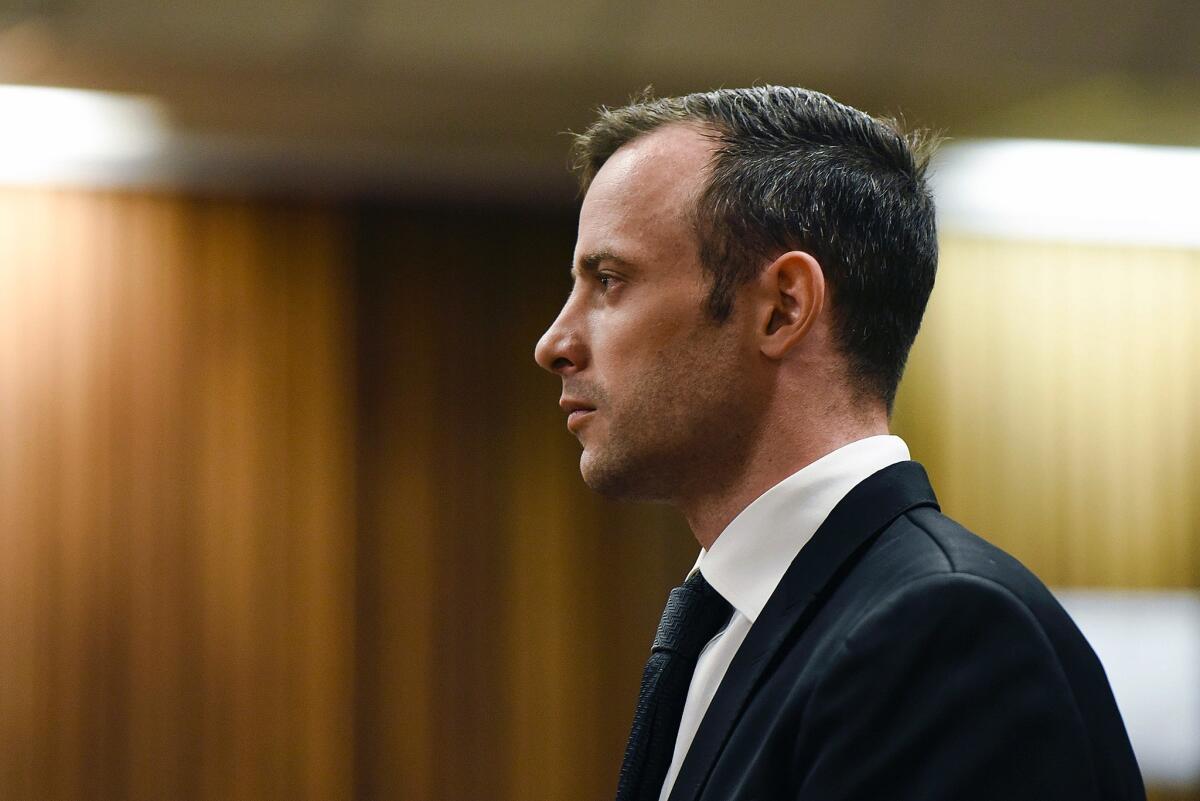Oscar Pistorius continues free on bail, plans to appeal murder conviction

South African athlete Oscar Pistorius listens during a bail hearing Dec. 8 at the Pretoria High Court.
reporting from south africa — Former Olympic athlete Oscar Pistorius will appeal his murder conviction to South Africa’s highest court as he remains free on bail after a hearing Tuesday.
Pistorius, who appeared briefly at the bail hearing, will continue to live at his uncle’s home and is allowed to leave daily between 7 a.m. and noon, so long as he remains within a 12.5-mile radius of the house. He will be electronically monitored and has to surrender his passport and post bail of $690.
He told the hearing that he was enrolled in a business law course through the London School of Economics and needs Internet access to continue his studies.
Pistorius, who shot his girlfriend, Reeva Steenkamp, four times through the closed door of his bathroom in February 2013, was convicted last week of murder by the Supreme Court of Appeal, which overturned his acquittal in 2014 on the charge. The panel cited errors by the trial judge.
If his appeal before the nation’s Constitutional Court fails, or he is not granted leave to appeal, his case will return to a lower court for sentencing on the murder charge.
Pistorius argued in an affidavit that he couldn’t afford to pay more than $690 in bail. The double amputee athlete was forced to sell his luxury home in a Pretoria gated community to cover his legal costs.
“I have no income, but I will continue to seek employment,” he said. “It was difficult to obtain employment due to my conviction and correctional supervision conditions. I have lost all my assets and only possess my personal assets.”
The supervision conditions, which only became public Tuesday, allowed him to leave the house during the morning hours, meaning he could not be at a workplace for a full day.
A family spokeswoman confirmed that Pistorius was enrolled in a University of London distance learning course accredited by the London School of Economics.
Prosecutor Gerrie Nel didn’t oppose bail, but failed to convince the court that Pistorius shouldn’t be allowed to leave the house in the mornings because he was a convicted murderer.
“I believe I will be successful in an appeal to the Constitutional Court,” Pistorius said in the affidavit, adding it would be unjust to deny him bail in the meantime. “I have shown a consistent commitment to letting justice take its course throughout this matter.”
Pistorius said he had completed an anger management course and would not attempt to flee. “I am well known and it would be senseless to even consider to become a fugitive of justice,” he said in his affidavit.
Nel said the only reason prosecutors didn’t oppose bail was because they reached agreement with Pistorius’ lawyers that he would remain at home throughout the day, only leaving if absolutely necessary with the permission of police.
He argued that bail conditions should be stricter for a person convicted of murder than of culpable homicide, or reckless killing, the lesser charge for which Pistorius was found guilty last year by the trial judge. He was sentenced to five years in prison then and was released two months ago to house arrest.
“This is now different,” Nel said. “He’s now convicted of murder. There’s a minimum sentence of 15 years.”
But Judge Aubrey Ledwaba rejected the prosecutor’s call for Pistorius to be forced to stay home all day, saying this would be a form of punishment and was not in the interests of justice.
Pistorius will base his appeal on the argument that the Supreme Court of Appeal overstepped its mark in convicting him of murder by revisiting the factual findings of the trial judge, in effect denying him a fair trial.
Under South African law, prosecutors can appeal an acquittal, but only on the basis of errors in applying the law by the trial judge. An appeals court may not weigh testimony again, overturning a trial court’s conclusions based on that evidence, but is entitled to determine if a trial judge failed to take into account certain evidence in reaching a conclusion.
The Supreme Court of Appeal said the trial judge, Thokozile Masipa, delivered a confused judgment, misapplied the law in key areas and ignored important police ballistics evidence.
Pistorius’ affidavit said the appeals court had no right to reject the trial judge’s finding that the athlete genuinely believed his life was in danger when he fired the four shots. He testified that he feared an intruder was behind the closed door.
The court will reconvene April 18 to report on the progress of Pistorius’ appeal.
Follow @robyndixon_LAT on Twitter for news out of Africa
More to Read
Sign up for Essential California
The most important California stories and recommendations in your inbox every morning.
You may occasionally receive promotional content from the Los Angeles Times.










